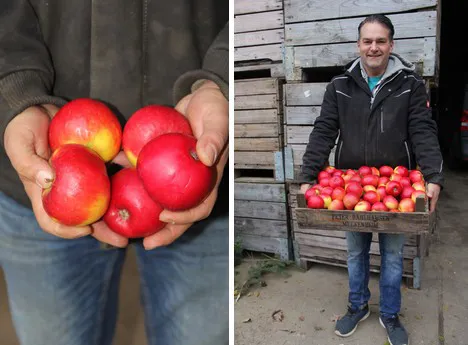Since late summer, fruit growers in the Rhineland have had one thing on their agenda: picking apples and pears. First came summer apples such as Delbarestivale and Barbarossa or Sunrise. Then, starting in September, the first ripe storage apples were picked, including Elstar, Gala and Wellant, for example. Whether sweet or tart, particularly aromatic and juicy or rather mild: the Rhineland fruit growers got something for everyone.
Philip Wißkirchen, first chairman of the Bonn/Rhein-Sieg Fruit Growers' Association, grows almost 20 different apple and pear varieties - including Wellant, Pinova and Elstar - on his fruit farm in Meckenheim. "This year, we were able to harvest well-matured aromatic fruit in the Rhineland due to the cool nights and sunny warm days," Wißkirchen reports. "That's important, because it's not just the name of a variety that pulls in the consumer; taste, freshness, quality as well as the appearance of the fruit are also decisive."

Carsten Dahlhausen is a fruit grower in Meckenheim
The right variety for every consumer
His colleague Carsten Dahlhausen can only confirm this. "Each target group wants its own taste experience," the grower from Meckenheim tells us. "While younger consumers in particular like to bite into sweet and crisp apples, older customers often prefer apple varieties that
they remember from childhood." Old familiar varieties include Cox Orange, Boskoop and Berlepsch, for example. "With the variety diversity in the Rhineland, there is a suitable variety for every consumer," says Dahlhausen.
His tip: "Simply ask at the farm store or supermarket for apples from the region and try them all!" What's more, since fruit growers in the Rhineland were able to harvest plenty of apples this year, regional produce won't be in short supply on supermarket shelves anytime soon.
'Climate-resistant' varieties
An important partner in variety selection for Rhineland fruit growers is the Campus Klein-Altendorf cooperation center just outside Bonn. More than 120 new apple and pear varieties are currently being tested there. In addition to taste, the fruit-growing experts at the Campus also test the cultivation values of a new variety. This means, for example, that new varieties should be robust enough to withstand certain fungal pathogens.
"Breeding variety is important when we consider climate change," explains Anke Fischer, trial manager at DLR Klein-Altendorf. "In the future, for example, the risk of late frost in spring or long periods of heat in summer will increase. That's why we're also testing how well new cultivars can cope with weather extremes." And thus, on balance, lead to further development in fruit growing in the Rhineland - for the benefit of fruit growers and consumers.
For more information:
Fachgruppe Obstbau Bonn/Rhein-Sieg
Kristina Wollseifen, Herbert Knuppen
E-Mail: [email protected]
